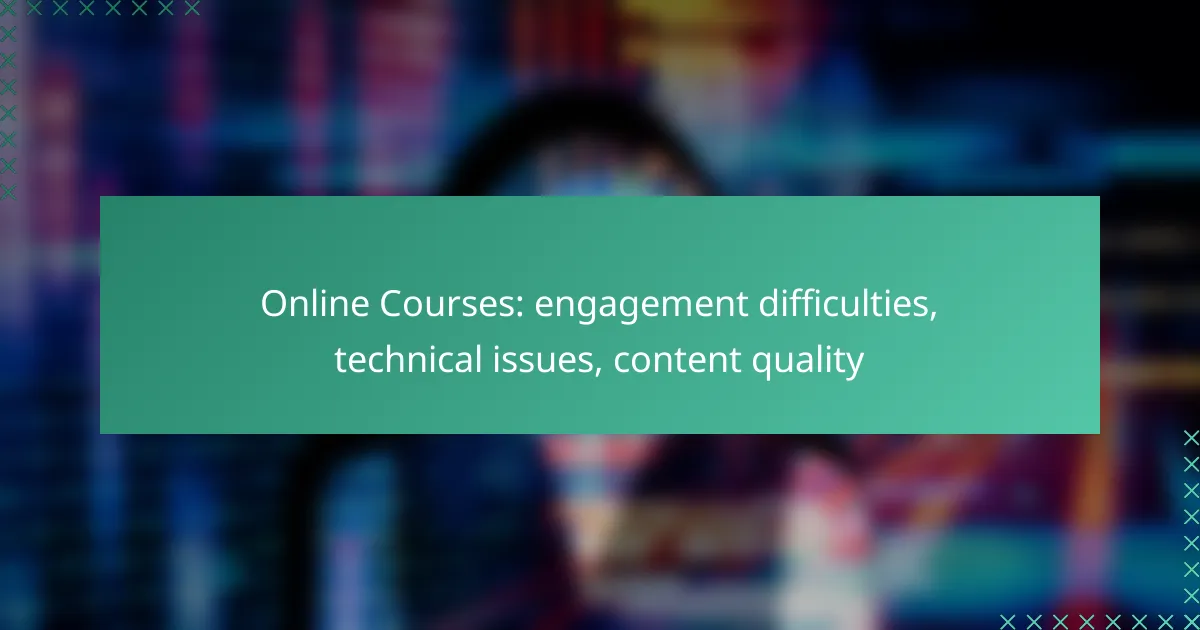Online courses offer a flexible learning environment but often face challenges such as engagement difficulties, technical issues, and varying content quality. Enhancing engagement through interactive elements and community support is crucial, yet technical problems like platform compatibility and internet connectivity can disrupt the learning experience. Additionally, evaluating the quality of course content is essential for ensuring effective learning outcomes.

How can online courses improve engagement in Canada?
Online courses in Canada can enhance engagement by incorporating interactive elements, gamification, and community support. These strategies not only make learning more enjoyable but also foster a sense of belonging among participants.
Interactive content features
Interactive content features, such as quizzes, polls, and simulations, can significantly boost learner engagement. By allowing students to actively participate, these tools make the learning experience more dynamic and memorable.
For example, using scenario-based simulations in a business course can help learners apply theoretical knowledge in practical situations, enhancing retention and understanding. Incorporating multimedia elements like videos and infographics can also cater to different learning styles.
Gamification strategies
Gamification strategies involve integrating game-like elements into online courses to motivate learners. This can include earning points, badges, or rewards for completing tasks, which encourages participation and persistence.
In Canada, platforms like Moodle and Canvas offer built-in gamification features that educators can utilize. Setting up leaderboards or challenges can create a competitive atmosphere that drives engagement, making learning more fun and interactive.
Regular feedback mechanisms
Regular feedback mechanisms are crucial for maintaining engagement in online courses. Providing timely and constructive feedback helps learners understand their progress and areas for improvement.
Instructors can use automated quizzes to give instant feedback or schedule one-on-one check-ins to discuss performance. This ongoing communication fosters a supportive learning environment and encourages students to stay committed to their studies.
Community-building initiatives
Community-building initiatives create a sense of belonging among learners, which is essential for engagement. Online forums, discussion groups, and social media platforms can facilitate interaction and collaboration among students.
In Canada, educators can leverage platforms like Slack or Discord to create spaces for students to share ideas and resources. Organizing virtual meetups or study groups can further strengthen connections and enhance the overall learning experience.
Personalized learning paths
Personalized learning paths allow students to tailor their educational experience according to their individual needs and preferences. This approach can lead to higher engagement as learners feel more in control of their education.
Using adaptive learning technologies, courses can adjust content based on a learner’s progress and performance. For instance, if a student excels in a particular topic, they can be directed to more advanced materials, keeping them challenged and engaged throughout the course.

What technical issues affect online courses?
Technical issues can significantly hinder the effectiveness of online courses, impacting both engagement and learning outcomes. Common problems include platform compatibility, internet connectivity, device accessibility, and software bugs.
Platform compatibility problems
Platform compatibility issues arise when the online course software does not function properly across different operating systems or browsers. For instance, a course designed for Google Chrome may not work as intended on Safari or Firefox, leading to frustration for users.
To mitigate these problems, course providers should ensure their platforms are tested on multiple browsers and devices. Regular updates and user feedback can help identify and resolve compatibility issues quickly.
Internet connectivity challenges
Poor internet connectivity can disrupt online learning experiences, causing delays or interruptions during live sessions. Students in areas with limited broadband access may struggle to participate fully, which can affect their overall engagement and performance.
To address connectivity challenges, it’s advisable to offer downloadable course materials that can be accessed offline. Additionally, providing recorded sessions allows students to catch up if they experience interruptions.
Device accessibility limitations
Device accessibility limitations refer to the challenges learners face when using different devices, such as smartphones, tablets, or laptops. Some online courses may not be optimized for mobile use, making it difficult for users to navigate or complete assignments.
Course designers should prioritize responsive design to ensure that content is easily accessible on various devices. Testing the course on multiple screen sizes can help identify and fix accessibility issues before launch.
Software bugs and glitches
Software bugs and glitches can lead to unexpected behavior in online courses, such as broken links, incorrect assessments, or lost progress. These issues can frustrate learners and diminish their trust in the course platform.
To minimize the impact of bugs, it’s crucial to conduct thorough testing before releasing new features. Establishing a clear process for reporting and addressing glitches can also help maintain a smooth learning experience.

How to assess content quality in online courses?
To assess content quality in online courses, consider factors such as instructor qualifications, the relevance and currency of course materials, student feedback, and any accreditation or certifications. These elements can significantly impact the learning experience and outcomes.
Instructor qualifications and experience
Evaluating the qualifications and experience of instructors is crucial for determining the quality of an online course. Look for instructors who hold advanced degrees in their field and have practical experience relevant to the course content.
Additionally, consider their teaching experience, especially in online formats. Instructors who have successfully taught online courses before are often better equipped to engage students and deliver content effectively.
Course material relevance and updates
The relevance and timeliness of course materials are essential for ensuring that students receive current and applicable knowledge. Check if the course content is regularly updated to reflect the latest trends and developments in the subject area.
Materials should also be aligned with industry standards and practices. For example, a technology course should include the latest software tools and methodologies used in the field.
Student feedback and reviews
Student feedback and reviews provide valuable insights into the effectiveness and quality of an online course. Look for platforms that aggregate reviews from past students to gauge overall satisfaction and learning outcomes.
Pay attention to specific comments regarding course content, instructor engagement, and the applicability of skills learned. A course with consistently high ratings and positive feedback is likely to be of higher quality.
Accreditation and certifications
Accreditation and certifications can enhance the credibility of an online course. Check if the course is offered by an accredited institution or organization, as this often indicates adherence to specific educational standards.
Additionally, certifications that are recognized in the industry can add value to the course. For example, courses that provide certifications from well-known professional bodies may be more appealing to employers.

What are the prerequisites for successful online learning?
Successful online learning requires a combination of technical skills, self-motivation, and access to the right technology. These prerequisites help learners navigate courses effectively and stay engaged throughout the learning process.
Technical skills required
Basic technical skills are essential for online learning. Learners should be comfortable using computers, navigating learning management systems, and troubleshooting minor technical issues. Familiarity with common software applications, such as word processors and video conferencing tools, is also beneficial.
To enhance your online learning experience, consider taking a short course on digital literacy if you feel unsure about your skills. This can help you become more adept at using the necessary tools and platforms.
Self-motivation and discipline
Self-motivation and discipline are crucial for maintaining progress in online courses. Unlike traditional classroom settings, online learning often requires students to manage their own schedules and stay accountable for their studies. Setting specific goals and creating a study routine can help maintain focus.
To cultivate self-discipline, try breaking your coursework into smaller, manageable tasks and rewarding yourself upon completion. This approach can keep you motivated and make the learning process more enjoyable.
Access to necessary technology
Access to reliable technology is a fundamental requirement for successful online learning. This includes a stable internet connection, a computer or tablet, and any necessary software. Without these, participating in online courses can be challenging.
Before enrolling in a course, ensure that your technology meets the platform’s requirements. Check for compatibility with video conferencing tools and any specific software needed for assignments. If you lack the necessary technology, consider local resources such as libraries or community centers that may provide access.

How do online courses compare to traditional education in Canada?
Online courses offer a different approach to education compared to traditional classroom settings in Canada, emphasizing flexibility and accessibility. While both methods aim to provide quality learning experiences, they differ significantly in structure, cost, and outcomes.
Flexibility and convenience
Online courses provide significant flexibility, allowing students to learn at their own pace and schedule. This is particularly beneficial for those balancing work, family, or other commitments, as they can access materials anytime and anywhere with an internet connection.
In contrast, traditional education typically requires attendance at specific times and locations, which can be challenging for many. Online platforms often include features like recorded lectures and discussion forums, enhancing convenience for learners.
Cost-effectiveness
Online courses are generally more cost-effective than traditional education in Canada. Tuition fees for online programs can be lower, and students save on commuting and accommodation costs. Many online courses also offer free or low-cost resources, making education more accessible.
However, it’s essential to consider the potential hidden costs of online learning, such as technology requirements and internet access. Students should evaluate their budget and the total cost of enrollment before committing to a program.
Learning outcomes and effectiveness
The effectiveness of online courses compared to traditional education can vary widely based on the course design and delivery. Many online programs employ interactive elements, such as quizzes and peer discussions, which can enhance engagement and retention of material.
Research indicates that students in online environments can achieve similar learning outcomes as those in traditional settings, but success often depends on self-discipline and motivation. Prospective students should assess their learning preferences and consider trial courses to determine what format suits them best.
